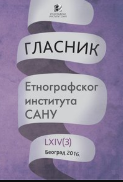Неке архаичне црте у друштвеном животу Брскућана (етнографске забелешке)
Traits in Social Life of Some Archaic Brskuceans (Ethnographical Notes)
Author(s): Zoran GudovićSubject(s): Customs / Folklore, Cultural Anthropology / Ethnology, Culture and social structure , Rural and urban sociology
Published by: Етнографски институт САНУ
Keywords: Traditional way of thinking; customs; industrialization; urbanization;
Summary/Abstract: In this paper the author has, using the descriptive method, pointed out some archaic aspects of the social life of an undeveloped and isolated village in Montenegro. By a brief analysis of the whole of its spiritual and material self-realization, it has been possible to recognize the important traits of traditional, tribal-brotherhood way of thinking and behavior. In that sense it is a noticeable proof that they survived notwithstanding the inevitable modernization of the village. The paper has involved the following four parts: The general data about the village; the social organization; the spiritual culture and customs, and finally the social processes and the ways of thinking and behavior. The intrinsic organization of living has been expressed by the hierarchical position of each family member. The position each member has taken has been less determined by the traditional elements of the rural economy and much more by the interiorization and preservation of spiritual worthiness wherein the remembering o f them has given the life a peculiar meaning. The village of Brskut has been a patriarchal milieu with an accent to the epic and combatant traditions where a child has been treated as an unfinished personality, so that the parents have cherished the merited regard only to the friends and grown-up persons as well as to the friendly oriented foreigners. Proceeding from the judgment relatives, tribesmen, brotherhood men and other friends are able to form of him or her, of their opinion he or she has held, he or she pleased them, experiencing the child as a disturbance by which the said relationship has been thwarted. Therefore the child has been generally neglected by the customary regulations in that milieu. The brotherhood links have been solid. The members of the same brotherhood have been visiting one another, respecting one another and helping one another believing that they have been originating from the same common ancestor. The common gatherings and meetings have been organized. The solid links have been originated from the cult of dead ancestors and relatives accentuated in all manifestations of living. The essential rural cultural milieu make the churches, the home, the cemetery and the common gatherings as the lasting institutions of the social life. The author has been pointing out the deep social changes involved in electrification, urbanization and motorization having imprinted an inerasable seal into the modernization of this village. The way o f the village out o f the cultural backwardness and the autarchic shut up, the author has been relating to the home, the school, electricity and the asphalt road as the essential factors of the change. Unfortunately, some of these factors (the home and the school) have not contributed to the staying o f the youth in the country, while some of them (the electricity and the road) have only sped up the process of their moving to towns.
Journal: Гласник Етнографског института САНУ
- Issue Year: LII/2004
- Issue No: 1
- Page Range: 267-281
- Page Count: 15
- Language: Serbian

